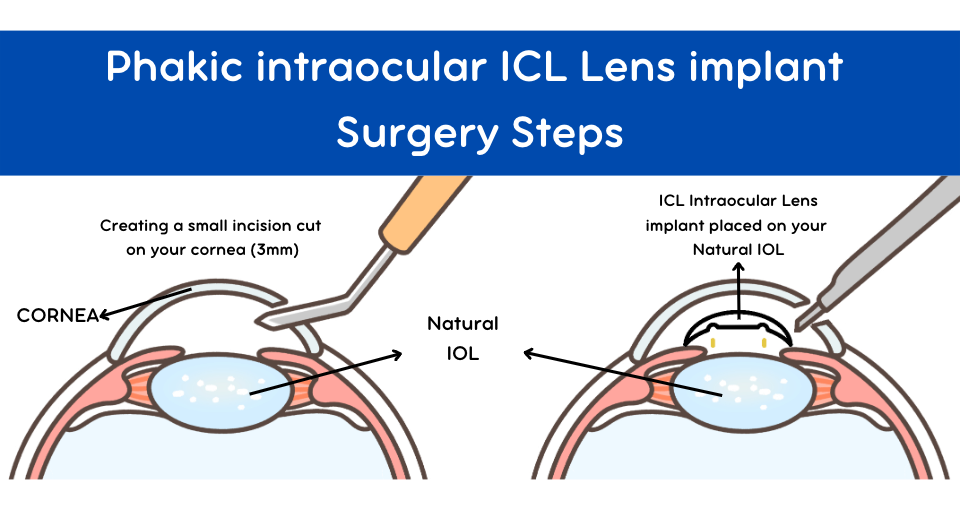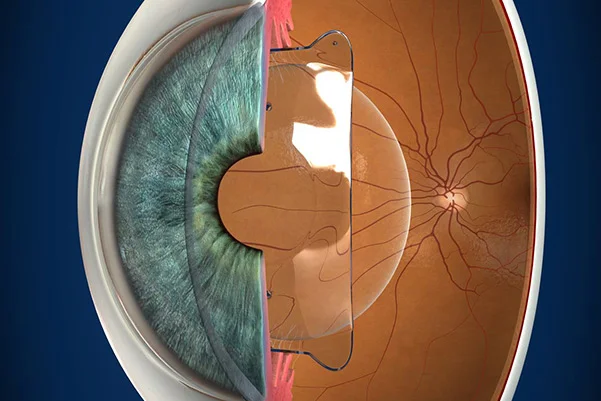Phakic intraocular lenses (IOLs) have emerged as a promising surgical treatment for keratoconus, a progressive eye condition that causes the cornea to thin and bulge into a cone shape. At the Khanna Vision Institute, our team of experienced ophthalmologists has been at the forefront of this innovative approach, offering patients a safe and effective solution to manage their keratoconus.
Phakic IOLs are specialized lenses that are implanted in the eye, in front of the natural lens, to correct refractive errors and improve visual acuity. Unlike traditional corneal procedures, such as LASIK or corneal cross-linking, phakic IOLs do not permanently alter the structure of the cornea, making them a suitable option for individuals with keratoconus.

Indications for Phakic IOLs
Phakic IOLs are typically recommended for patients who:
Have high degrees of myopia (nearsightedness) or hyperopia (farsightedness) that exceed the correction range of laser eye surgery.
Have thin corneas or other corneal abnormalities that make them unsuitable candidates for corneal refractive surgery.
Seek a reversible and adjustable vision correction option.
Desire a procedure that preserves the natural accommodation ability of the eye.
Types of Phakic IOLs
Anterior Chamber Phakic IOLs: These lenses are placed in front of the iris but behind the cornea. An example of this type is the Verisyse lens.
Posterior Chamber Phakic IOLs: These lenses are placed behind the iris and in front of the natural lens. An example of this type is the Visian ICL (Implantable Collamer Lens).

Procedure
Preoperative Evaluation:
A comprehensive eye examination is conducted to assess the patient’s suitability for the procedure. This includes measuring the eye’s internal dimensions, evaluating corneal thickness, and checking for any underlying eye conditions.
Surgical Preparation:
The procedure is typically performed on an outpatient basis under local anesthesia and eye drops are used to dilate the pupil and numb the eye.
Lens Implantation:
For anterior chamber phakic IOLs, a small incision is made at the edge of the cornea, and the lens is inserted into the anterior chamber.
For posterior chamber phakic IOLs, the lens is inserted behind the iris through a small corneal incision. The lens unfolds and is positioned in front of the natural lens.
Postoperative Care:
Patients are usually prescribed eye drops to prevent infection and reduce inflammation. Follow-up visits are scheduled to monitor the healing process and the position of the lens.
Benefits
High Degree of Correction:
Effective for correcting high levels of myopia and hyperopia that are beyond the range of laser surgery.
Preservation of Natural Lens:
The natural lens is left intact, allowing for the preservation of the eye’s natural focusing ability.
Reversible:
The procedure is reversible, and the lens can be removed if necessary.
Rapid Visual Recovery:
Patients typically experience rapid improvement in vision shortly after the procedure.
Risks and Considerations
Lens Dislocation:
The implanted lens may shift from its intended position, requiring further intervention.
Cataracts:
There is a potential for cataract formation over time.
Glaucoma:
Increased intraocular pressure can occur, leading to glaucoma.
Endothelial Cell Loss:
There is a risk of damage to the corneal endothelial cells, which can affect corneal clarity.
The Khanna Vision Institute has a well-established track record of successfully performing phakic IOL implantation procedures for keratoconus patients. Our team of highly skilled surgeons utilizes the latest advancements in phakic IOL technology, ensuring precise measurements, customized lens selection, and meticulous surgical techniques to achieve optimal outcomes.
Patients who undergo phakic IOL surgery at the Khanna Vision Institute can expect a safe and effective treatment that can significantly improve their visual function and quality of life. The procedure is typically performed as an outpatient surgery, with a relatively short recovery time, allowing patients to return to their normal activities quickly.
By choosing the Khanna Vision Institute for your keratoconus treatment, you can be confident that you are in the hands of a team of experts who are dedicated to providing the best care and ensuring the highest possible results for our patients.